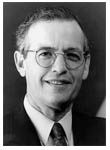 Intellectual Comradery
Intellectual Comradery
The President's Page: June 7, 2000
 Intellectual Comradery
Intellectual Comradery
Learning and personal growth take place in a large variety of circumstances, and I am sure that many alumni would agree that learning that occurs outside of the classroom can be as memorable as learning that happens through formal academic work. Indeed, an important part of the Princeton experience is participating as an active member of a residential academic community in which there are many and varied opportunities for faculty and students and students themselves to connect outside of the classroom. Some of these interactions occur because our campus is fairly contained physically, so the chance for serendipitous encounters between members of the academic community is high. But a wide variety of common interests also brings people together in special groups.
For example, religious groups, community service activities, the choir, and the orchestra all include both faculty as well as students. Faculty occasionally participate in student dramatic productions, and I even have had brief roles myself in several Triangle shows. Outdoor Action programs attract faculty especially for day trips. Of course, our recreational facilities are a common meeting ground for many members of our academic community. Even the indoor climbing wall at the Armory is frequented by students and faculty alike.
Through the residential colleges Princeton has made a deliberate effort to bring faculty into the lives of students. The Graduate College "high table" includes faculty on a regular basis. The Prospect Street eating clubs have faculty fellows programs that encourage students to bring faculty to dinner to talk about their research interests. My wife, Vivian, and I entertain students regularly during the semester for breakfast. Students sign up for these breakfasts on a first-come, first-served basis, and the conversations range from athletics and bioethics to University governance and planning. Over the years faculty interested in specific athletic programs have become a part of the life of athletic teams. This year the athletics department is formalizing these connections by establishing an advisory board of faculty to promote faculty-team connections that will add yet another dimension to the Princeton experience of our student-athletes. In the context of these groups and social occasions, exchanges and friendships do take root.
Students also have taken the initiative in seeking out faculty to continue exploring topics of interest first encountered in the classroom. At the request of students, the University Center for Human Values began a dinner forum program for faculty and students. Run by students, the forum includes faculty fellows from religion, philosophy, and politics who come together with students to explore controversial ideas, from school vouchers to the Holocaust. According to students in the program, it successfully nurtures their passion for ideas.
I recently received an invitation from a student group, Paideia, to participate in their on-going dialogue. This student organization was started by Josh Halpern '00 and Ana Quesada '00. Ana traces the roots of this group to the humanities course series: "Some of my fellow classmates and I realized that the humanities series was too good to be true. We decided to take the best aspects of the series and try to graft them onto the social scene at Princeton. We wanted to reproduce the 'intellectual comradery' that naturally sprouts during the series and try to make it happen for students outside of the classroom. We saw that the vast majority of students did not find such friendship and growth in their coursework, and that the social scene was thirsting for such a group."
Launched last fall, the program is centered around weekly dinners of faculty and anywhere from 15 to 30 students, who come from all four classes and a variety of academic backgrounds. Faculty prepare a 20-25 minute "opener" and then lead the group in a free-flowing exploration of a text, an ethical issue, or a new technological advance. Topics have ranged from the ethics of a Supreme Court decision with Professor Amy Gutmann (politics), to Dante's Canto's with Professor Robert Hollander '55 (romance languages), nuclear proliferation with Professor Frank von Hippel (Woodrow Wilson School), art with Professor John Wilmerding (art and archaeology), the presidential elections with Professor Patrick Deneen (politics), Machiavelli and his books with Professor Anthony Grafton (history), millennialism with Professor Theodore Rabb (history), technology and its influence on history with Michael Sugrue (Humanities Council), and even Byzantine chants with Professor Peter Jeffries (music). The group also meets outside of these dinners-for study breaks in Prospect Garden or the Princeton Battlefield park or for a reading of Edgar Allen Poe. According to one of the group's leaders, Jeff Gelfand '01, faculty often comment on the energy and interest the students bring to the discussions. In terms of student reaction, he adds that "many of our members have said that 'this is what I came to Princeton for.' "
The descriptions of these student-faculty programs fail to convey the intensity of the exchanges that often occur in these informal settings, the intellectual depth that characterizes them, and the confidence they give students to test and explore their own ideas. The name "paideia," which dates to the Hellenistic age, originally meant "education" and came to denote the "condition of a person achieving enlightened, mature self-fulfillment." By creating these bridges between the intellectual and social aspects of campus life, the students in Paideia and other similar programs are demonstrating a profound understanding of the fundamental meaning of "education."
GO TO the Table of Contents of the current issue
GO TO
PAW's home page